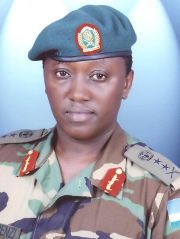Allegations resurface against deputy commander of UN-AU force in Darfur
December 22, 2007 (NEW YORK) — US based rights watchdog Human Rights Watch (HRW) urged the United Nations and the African Union (AU) to further investigate alleged human right violations believed to be committed by the deputy commander of the Darfur peacekeeping force.

“Press accounts identify General Karake as the commanding officer of Rwandan troops who fought against Ugandan army forces at Kisangani during that period” HRW letter said.
Karake came under the spotlight last August when the Rwandan United Democratic Forces (UDF) opposition group said that the general is responsible for a number of killings between 1992 and 2000.
UDF allege in one incident that Karake as Head of Military Intelligence directed an assault against an Internally Displaced Camp (IDP) camp on April 22, 1995 leading to the death of 8,000 people.
The UN at the time invited groups and individuals to submit any supporting evidence against Karake after which they concluded that there was no evidence to support the charges.
HRW said that while there is no proof that Karake ordered the attacks but stressed that he “was undoubtedly aware of the impact of Rwandan military operations on the civilian population, and had the authority to end these egregious violations.”
The Sudanese and Rwandan government defended Karake and insisted that he be endorsed as the deputy commander of the UN-AU force.
The rights watchdog said that Karake should be removed if implicated.
“If it is found that he bore responsibility for violations of international law, General Karake should be removed from his position as the Deputy Commander of UNAMID”.
Rwanda has around 3,000 peacekeepers out of the 7,000 troops in Darfur as part of the African Union forces and has promised to send additional ones as part of the hybrid force.
The U.N. Security Council authorized up to 26,000 troops and police for Darfur and approved the use of force to protect civilians against violence which has driven more than 2.1 million people from their homes over the past four years.
(ST)
